
Summary of Argument
As this Court has recognized, youth matters in criminal sentencing. Individuals who commit crimes while under 18 years of age are less culpable than adult offenders and are presumed to have the capacity for rehabilitation. For that reason, the Court held in Miller v. Alabama, 567 U.S. 460 (2012), that a court may not sentence a juvenile offender to life imprison- ment without the possibility of parole unless he or she is permanently incorrigible. Id. at 479-480. The Court also explained that juvenile life without parole sentences should be rare, because very few juvenile offenders are permanently incorrigible. Ibid. The Court reaffirmed the Miller rule in Montgomery v. Louisiana, 136 S. Ct. 718 (2016), and applied that rule retroactively to cases pending on collateral review. Id. at 732.
The question in this case is whether a sentencing court must find that a juvenile offender is permanently incorrigible before sentencing that person to life imprisonment without parole. The answer is yes.
Requiring a sentencing court to make a finding of permanent incorrigibility is necessary to give effect to the constitutional rule set out in Miller and Montgomery. In those cases, the Court distinguished between two classes of juvenile offenders – the very small category of offenders who are permanently incorrigible, and the much larger category of those who are not. Because only permanently incorrigible juvenile offenders can receive sentences of life imprisonment without parole, a court seeking to impose that sentence must make a finding of permanent incorrigibility in order to comply with the Eighth Amendment.
Requiring a sentencing court to make a finding of permanent incorrigibility ensures that the court has correctly assessed the offender’s eligibility for life imprisonment without parole. In Miller, the Court instructed sentencing courts to conduct holistic and individualized assessments of juvenile offenders’ characteristics and circumstances. The Court also set out certain factors for sentencing courts to consider as part of those assessments. But courts have misunderstood some of the factors and thus have not been correctly performing the assessments Miller requires.
Further, requiring a sentencing court to make a finding of permanent incorrigibility helps to avoid biased sentencing and ensures meaningful appellate review. If a court is not required to make such a finding on the record, it may rely on conscious or subconscious biases, including racial biases, instead of considering the particular facts and circumstances of each offender.
Finally, requiring this finding will not be burdensome. State and federal courts already must comply with Miller, so requiring determinations of permanent incorrigibility will not meaningfully add to the courts’ tasks. And those findings are exactly the type of determinations that courts routinely make during sen- tencing. At the same time, requiring findings of permanent incorrigibility is critical to ensuring compliance with the Eighth Amendment.